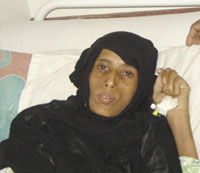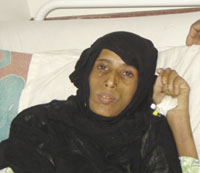
Traditional practices behind TB spread in Yemen [Archives:2007/1028/Health]
February 26 2007
 |
[email protected]
Yemeni habits and customs are considered the main causes for the spread of the chronic and infectious disease, tuberculosis. TB is one of the infectious diseases that Yemeni habits contribute in its existence.
Bronchoscopy specialist and a professor at Sana'a University Dr. Ahmed Al-Hammami says, “Most Yemenis know that tuberculosis is an infectious disease; however, they deal with TB patients the same as they do with non-infected individuals. Our social habits and customs, such as eating together from the same dish, drinking from the same cup and sitting with infected patients in the same room contribute to spreading the disease quickly. Sometimes a father, mother or other family member will take an infant and kiss it; consequently, he or she transmits the disease to the infant.
“Yemenis chew qat and smoke together in the same room, which also increases the chance of spreading the disease,” he added.
As an infectious disease, TB can spread by many means, including via saliva, sneezing, coughing, drinking or eating with infected individuals.
Tuberculosis is widespread in Yemen due to a suitable environment characterized by lack of knowledge about the danger of the disease, poverty and many other causes, including nutritional shortage, dirtiness, lack of health consciousness among citizens and sitting with infected individuals, according to Al-Hammami.
“Poverty is another reason for the spread of tuberculosis, with the Tihama region considered one of the most infected areas in Yemen because residents there are unable to go to hospitals,” Al-Hammami noted.
Although TB shares symptoms with other diseases, it's easy to diagnose the disease. Al-Hammami explains, “A TB patient may have caves in his lungs, which is considered the most dangerous phase of tuberculosis. He or she may have inflammation in the lungs, intestines or genital region. He or she also may experience fever or weak appetite.”
Taher Rasam, 65, from Taiz notes, “I've been suffering from tuberculosis for three months. In the beginning, I had a tumor in my lower neck and the doctor eradicated it. Then, there was flatulence in my abdomen. I now experience inflammation in my lungs and a strong cough.”
Tuberculosis targets all age groups, but most are youths. “Tuberculosis doesn't differentiate between children, youths, adults or the elderly, but most patients are youths due to their carelessness and malnutrition because they always eat sandwiches and other simple things,” Al-Hammami explained.
Khazna Saleh, 20, from Hadramout commented, “I've had tuberculosis for a year. I experience a strong cough, fever, vomiting and diarrhea.”
Sixteen-year-old Sawsen Ahmed Ali, from Rada'a recalls, “In the beginning, I had coughing, fever and chest pain. I now experience complete weakness, weak appetite and strong coughing.”
Ameena Abdulwahab, 22, from Sana'a says, “I contracted tuberculosis six months ago. My elder brother had the disease for approximately nine months and I think he infected me. I experience a strong cough, fever and total weakness and I vomit blood when I cough.”
Al-Hammami emphasizes, “We can diagnose tuberculosis and treat patients easily until their complete recovery, but the problem is that some don't stick to taking medicine until the end. Most of the time, they take the medicine until they recover and then they give up taking it. This is wrong because if the patient doesn't take his medicine until the end, he'll become infected with the disease again and it'll be more difficult to treat him because the body's immunity gets weaker and has become accustomed to the medicine. Consequently, the medicine won't have its required effect.
“Additionally, doctors sometimes don't give patients the proper medicine,” he added.
Jameel Al-Ansi, 28, comments, “This is the second time I've had tuberculosis. I was infected approximately two years ago, so I took medicine for three or four months and then I recovered. This time, I contracted the disease three months ago and I have the same symptoms, such as a strong cough, fever and weak appetite.”
Al-Hammami stressed that TB patients must take medicine for six months. He or she is given four types of medicine for the first two months and other medicine for the remaining four months.
According to a 1990-1991 survey, there are 43 TB patients for every 100,000 Yemeni people. A new Yemeni census began Feb. 17 under the auspices of the Ministry of Public Health Care and Environment and the Ministry of Education and in corporation with Global Fund against AIDS, Malaria and Tuberculosis.
The survey is targeting approximately 130 schools randomly selected nationwide and will involve 30,000 students between ages 7 and 12. It aims to specify the disease's causes and compare these survey results with those from 1990-1991.
——
[archive-e:1028-v:14-y:2007-d:2007-02-26-p:health]


